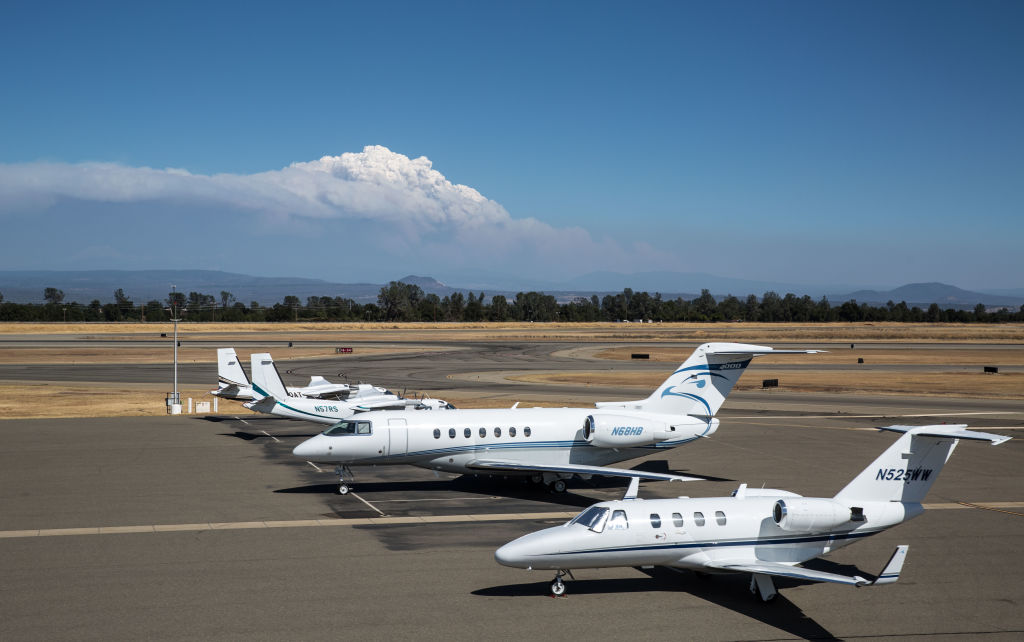
Those who can afford to own a private jet make up just 0.0008% of the global population. Yet, on a per-passenger basis, private jets generate 10 times more carbon emissions than commercial airlines.
Now, a new study by the D.C.-based non-profit Institute for Policy Studies and the non-partisan national organization Patriotic Millionaires shows the amount of taxes private-jet users pay doesn’t match up with the scale of impact this ultra-wealthy luxury is having on our planet.
Roughly one out of every six flights managed by the Federal Aviation Administration (FAA) is a private-jet flight. Yet private jets only contribute 2% of all taxes that fund the FAA. For the average flier, these appear as a 7.5% charge on the price of the ticket plus a passenger facility fee of up to $4.50. Private-jet users meanwhile only pay a fuel surcharge tax of roughly $0.22 per gallon. (Fuel taxes for commercial flights are another item often added to the ticket cost, but they vary by airline and route.) Combined, these taxes help pay for things that everyone benefits from, like maintenance of airports runways and staffing air traffic control.
Read more: From Private Jets to Superyachts, Here’s the Climate Impact of the Rich and Famous
Private air travel has been booming in popularity since the pandemic began. The use of private jets has grown by 20% since 2020, with related emissions increasing by more than 23%. Before the pandemic, the FAA tracked 4.8 million domestic and international private-jet flights in 2007. By 2022, that had grown to 5.3 million. (Most of these are domestic; in 2022, flights within the U.S. made up 85% of all private aircraft trips.)
As this trend continues, inequality will grow too—unless, as the authors of the new report argue, we rethink how jetsetters are taxed, and what sorts of concessions we allow them. That’s already happening in some places outside the U.S.; Schiphol Airport, the largest in the Netherlands, said recently that it plans to ban private jets from using its runways.
Read more: Why You Should Care About Celebrities’ Climate Hypocrisy
There are a few ways to reimagine air travel taxes. As the authors of the new study suggest, a “transfer fee” could be imposed on the sale of a jet, whether new or pre-owned. This is something Canada did last year, setting a 10% luxury tax on the purchase of new aircraft manufactured after 2018 and valued at over $74,000 (CAD$100,000). (It also did the same for yachts and luxury cars.)
Other researchers have proposed a “frequent flying levy”—a tax that increases with each additional flight you take on an annual basis after your first (which wouldn’t be taxed). The more you fly, the more you pay. Rather than a flat climate tax, this structure better targets the subset of people who contribute most to the emissions impact of air travel.
However you think about it, the underlying assumption is the same: If the amount a person paid to fly more accurately reflected the environmental impact of their flight, maybe that would shift how people think about the way they travel, making less-polluting options more affordable. And as the authors of this week’s study write, “any taxes imposed will not affect 99% of us and the revenue raised could be used to ensure we have a more environmentally sustainable planet.”
More Must-Reads from TIME
- Cybersecurity Experts Are Sounding the Alarm on DOGE
- Meet the 2025 Women of the Year
- The Harsh Truth About Disability Inclusion
- Why Do More Young Adults Have Cancer?
- Colman Domingo Leads With Radical Love
- How to Get Better at Doing Things Alone
- Michelle Zauner Stares Down the Darkness
Contact us at letters@time.com



